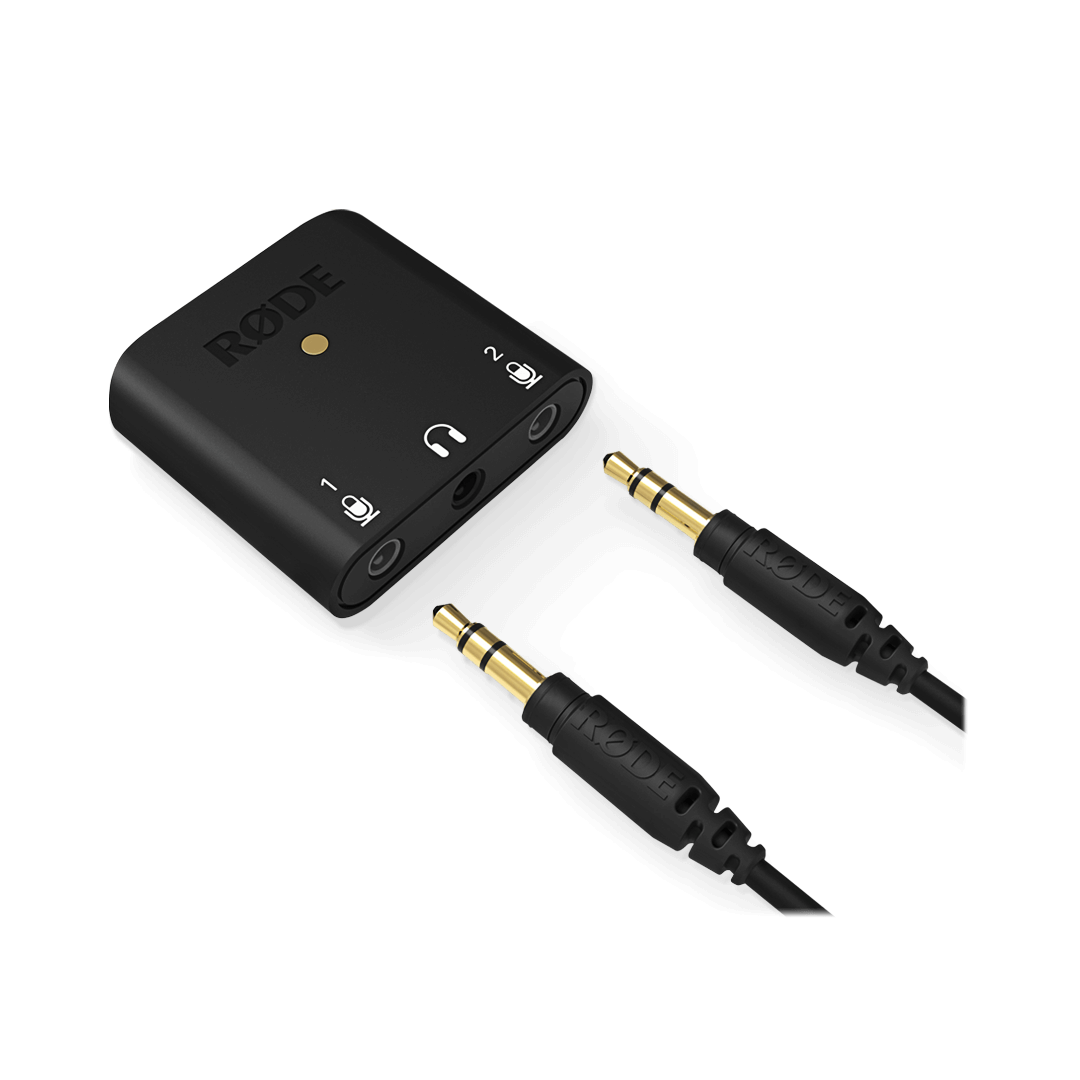AI-Micro
Kompakte Audio-Schnittstelle
Der AI-Micro ist ein ultrakompaktes Zweikanal-Interface zur Aufnahme von hochwertigem Audio auf ein mobiles Gerät oder einen Computer. Er verfügt über zwei automatische Eingänge zum Anschluss nahezu jedes Mikrofons mit einem 3,5-mm-Ausgang, Kopfhörerüberwachung, einen universellen USB-Ausgang zur Verwendung mit Smartphones, Tablets und Computern sowie Kompatibilität mit RØDE-Apps für einen verbesserten Klang. Der AI-Micro ermöglicht es Ihnen, ohne Grenzen aufzunehmen.
Hauptmerkmale:
- Ultrakompaktes Zweikanal-Audio-Interface für Computer und mobile Geräte
- Kompatibel mit nahezu jedem Mikrofon mit einem 3,5-mm-Ausgang, einschließlich RØDE VideoMics, Lavaliermikrofone, drahtlose Systeme und Stereo-Mikrofone, die keine Plug-in-Stromversorgung benötigen
- Automatische Eingänge zum Anschluss von TRS- oder TRRS-Mikrofonen
- Hochwertiger Kopfhörerausgang für latenzfreie Audioüberwachung und Wiedergabe
- Nahtlose Verbindung zu Computern, Smartphones und Tablets über den universellen USB-Ausgang (USB-A, USB-C und Lightning-Kabel im Lieferumfang enthalten)
- Kompatibel mit der RØDE-App-Suite für erweiterte Funktionen und Konfigurationen unterwegs sowie für Aufnahmen in Broadcast-Qualität auf jedem Gerät
- Ultra-kompaktes Zweikanal-Audio-Interface für Computer und mobile Geräte
- Kompatibel mit nahezu jedem Mikrofon mit einem 3,5-mm-Ausgang, einschließlich RØDE VideoMics, Lavaliermikrofonen, drahtlosen Systemen und Stereomikrofonen, die keine Plug-in-Stromversorgung benötigen
- Auto-erkennende Eingänge zum Anschließen von TRS- oder TRRS-Mikrofonen
- Hochwertiger Kopfhörerausgang für latenzfreies Audio-Monitoring und Wiedergabe
- Verbindet sich nahtlos mit Computern, Smartphones und Tablets über den universellen USB-Ausgang (USB-A, USB-C und Lightning-Kabel im Lieferumfang enthalten)
- Kompatibel mit der RØDE-App-Suite für erweiterte Funktionen und Funktionalität, Konfiguration unterwegs und Aufnahme in Broadcast-Qualität auf jedem Gerät
Unglaublicher Klang, überall
Der AI-Micro ermöglicht es Ihnen, mühelos hochwertige Audioaufnahmen auf Ihrem Mobilgerät oder Computer zu machen. Er verfügt über zwei 3,5-mm-Eingänge zum Anschluss einer Vielzahl von Mikrofonen, einschließlich RØDE VideoMics, Lavaliermikrofone, drahtlose Systeme wie das Wireless GO. Diese Eingänge sind auto-sensing und erkennen, ob ein TRS- oder TRRS-Mikrofon angeschlossen ist, und passen sich automatisch an – keine Adapter erforderlich. Eingang 1 kann auch als einzelner Stereo-TRS-Eingang konfiguriert werden, um mit Stereomikrofonen verwendet zu werden, die keine Plug-in-Stromversorgung benötigen.
Hochwertige Mikrofonvorverstärker und hochauflösende (24-Bit/48kHz) Aufnahmen sorgen für kristallklare Audioaufnahmen auf jedem Gerät, mit einem Kopfhörerausgang für echofreies Audio-Monitoring und -Wiedergabe. Egal, ob Sie Interviews führen, Podcasts aufnehmen, präsentieren oder livestreamen, nehmen Sie überall unglaublichen Klang mit dem AI-Micro auf.
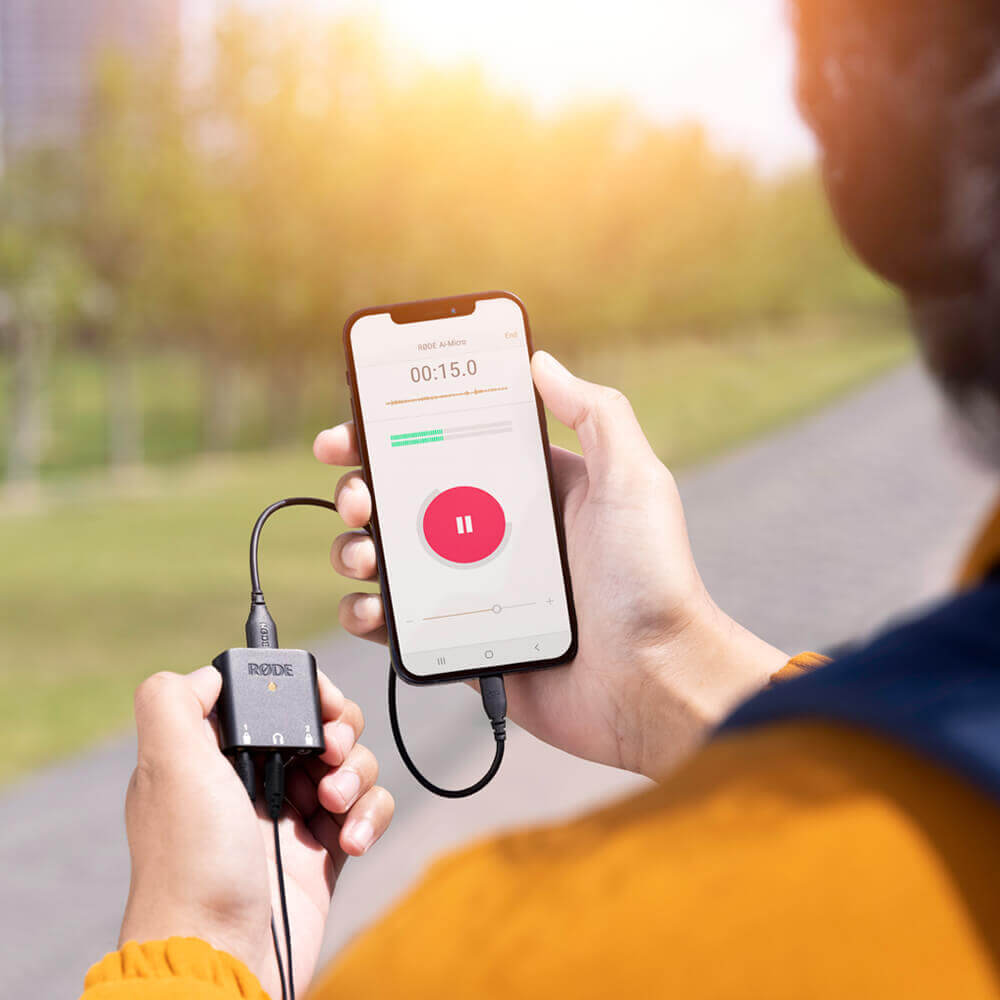
Universelle Kompatibilität mit all Ihren Geräten
Der AI-Micro kann nahtlos mit all Ihren Geräten über seinen universellen USB-Ausgang verbunden werden. Er wird mit USB-A, USB-C und Lightning-Kabeln geliefert, sodass Sie sofort mit der Aufnahme beginnen können. Er ist plug-and-play-kompatibel mit Mac-, Windows-, iOS- und Android-Geräten. Tragbares Aufnehmen war noch nie einfacher.
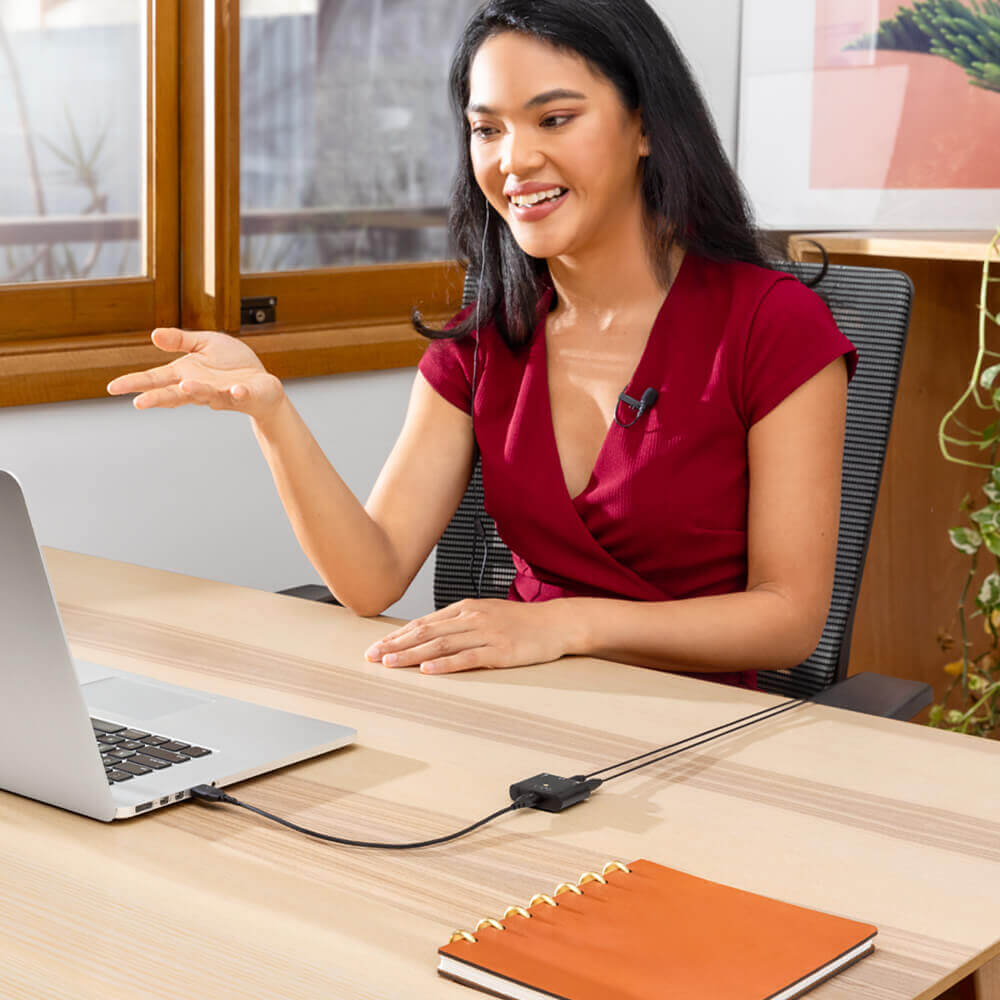
Taschenformatige Tragbarkeit
Mit einem Gewicht von weniger als 20 Gramm ist der AI-Micro äußerst kompakt und leicht. Fügen Sie einfach zwei Lavalier-Mikrofone hinzu, und Sie haben ein komplettes, studioqualitätiges Aufnahme-Setup, das in Ihre Tasche passt. Perfekt für Interviews im Freien, Podcasting unterwegs und Videoanrufe oder Livestreams zu Hause.
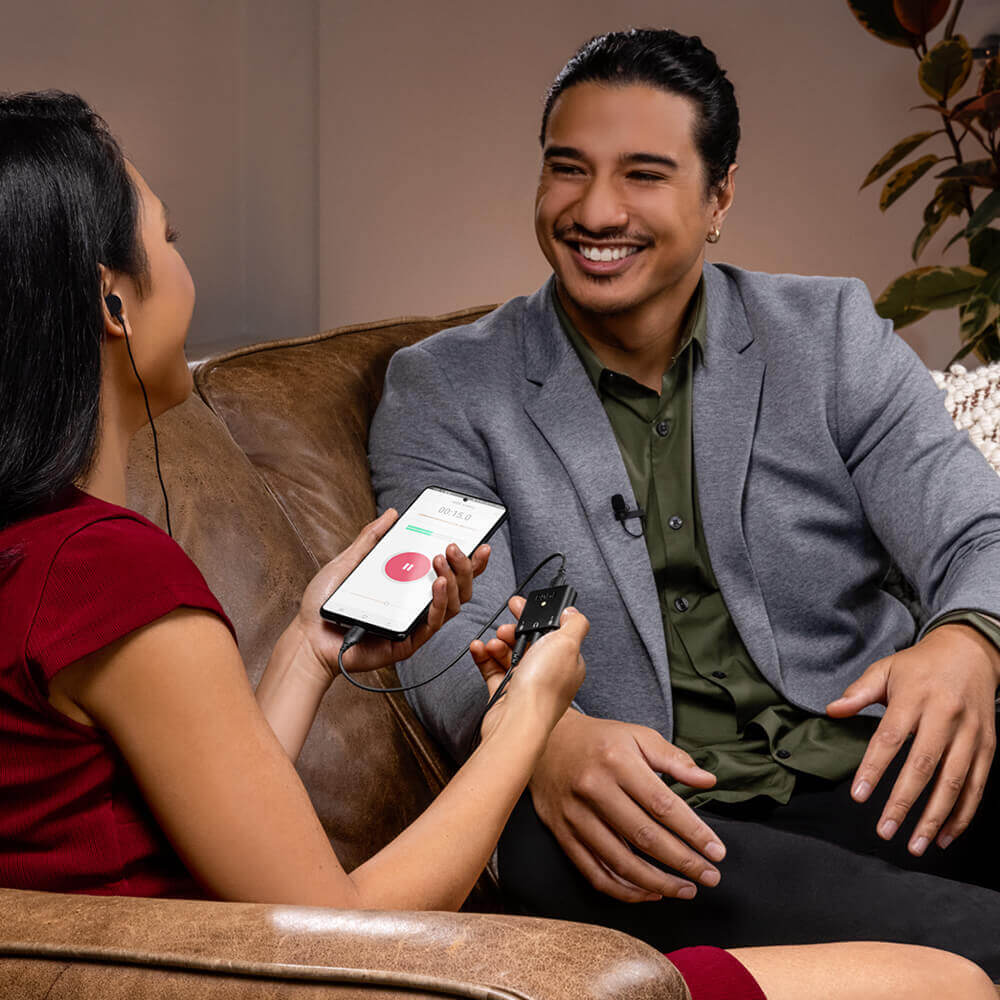
AI-Micro Benutzerhandbuch
Das AI-Micro Benutzerhandbuch erklärt alles, was Sie über die Verwendung Ihres AI-Micro wissen müssen. Dieses umfassende Handbuch behandelt alles vom Einstieg bis zur Aktualisierung der Geräte-Firmware und wie Sie erweiterte Funktionen und Features mit der RØDE App-Suite, einschließlich RØDE Connect, RØDE Reporter und RØDE Central, nutzen können.
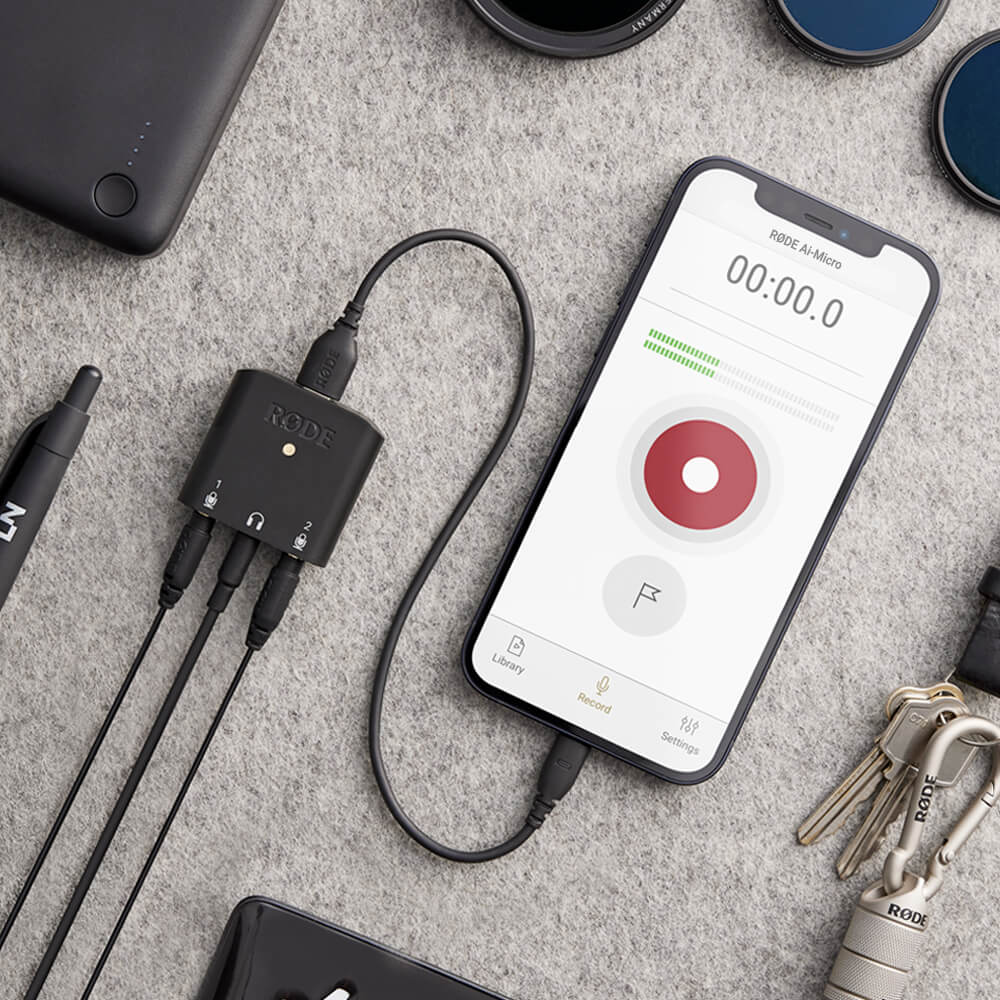
Verleihen Sie Ihrem Mikrofon mehr Power
Der AI-Micro ist mit der gesamten RØDE App-Suite kompatibel, und bietet Ihnen Zugang zu erweiterten Funktionen
und Funktionalitäten, Konfiguration unterwegs, Aufnahme in Rundfunkqualität auf jedem Gerät.

RØDE Connect
Nehmen Sie Podcasts oder Livestreams in Profiqualität auf einem Computer mit Ihrem 3,5-mm-Mikrofon auf. Nehmen Sie mit bis zu vier Mikrofonen auf einem Computer auf. Greifen Sie auf Studioqualität-Audiobearbeitung mit einem Klick zu und vieles mehr.

RØDE Reporter
Nehmen Sie Audio in Rundfunkqualität überall mit Ihrem Smartphone oder Tablet auf, mit vollständiger Kontrolle über die Einstellungen des AI-Micro, einer Echtzeit-Wellenformanzeige und Pegelmesser, nativer Freigabe und mehr.

RØDE Central
Konfigurieren Sie Ihr AI-Micro mit Ihrem mobilen Gerät oder Computer, einschließlich der Einstellung des Mikrofoneingangspegels und der Kopfhörerüberwachungslautstärke, Aktivierung eines Hochpassfilters und mehr.
Technische Daten
Häufig gestellte Fragen
The AI-Micro can be used with iOS and Android smartphones and tablets, and Mac and Windows computers, as long as the device has a USB-A, USB-C or Lightning connector. OS requirements: macOS Big Sur and higher, Windows 10 (Build 19041) and higher, iOS 14 and higher, Android 9.0 and higher.
You can plug virtually any microphone that has a 3.5mm output into the AI-Micro. This includes RØDE VideoMics, lavaliers, wireless systems like the Wireless GO, and stereo microphones that do not require plug-in power. The AI-Micro's microphone inputs are TRS/TRRS auto-sensing, meaning they automatically detect whether a TRS or TRRS microphone is connected and adapt to accommodate either connection type.
While similar in design and concept to the SC6-L, the AI-Micro has a few key updates that make it far more versatile, including a universal USB output for use with Android smartphones and tablets (and iOS devices with a Lightning port like the SC6-L), as well as computers. It has also enhanced inputs for use with a wider range of microphones and is compatible with the RØDE app suite for accessing advanced features, on-the-go configuration, and broadcast-quality recording on any device.
Yes. To connect the AI-Micro to an iOS device with a Lightning port, you need a Lightning Accessory Cable – either the included SC21 cable, or the RØDE SC15 or SC19.
We recommend using the included cables to connect the AI-Micro to your device. If you require a longer cable, there is a selection of different cable types available from the RØDE accessory range. To connect the AI-Micro to an iOS device with a Lightning port, you need either the included SC21 cable, or the RØDE SC15 or SC19.
Check out the AI-Micro User Guide for detailed information on its functions and features.
The input gain for each of the AI-Micro's microphone channels can be adjusted in RØDE Connect, RØDE Central and RØDE Reporter. You can also adjust the input gain using the level control in third-party audio or video apps if they have this feature. If you are using an app without a level control and would like to adjust the input gain, use RØDE Central, as any changes made to the levels in RØDE Connect or RØDE Reporter will not be retained when using another app.
The AI-Micro allows you to configure how the audio from the input channels is routed to the output. There are three different channel modes, ‘Merged’, ‘Split’ and ‘Stereo’, which are suited to different microphone setups.
In ‘Merged’ mode, the input signal is routed to both the left and right channels of the output, which is ideal if you are just using one microphone. In ‘Split’ mode, input 1 is routed to the left channel of the output and input 2 is routed to the right channel, which is ideal if you are using two microphones. ‘Stereo’ mode is ideal when you are using a stereo microphone; the left and right channels of input 1 are routed to the respective channels of the output to ensure you retain the microphone’s stereo image (input 2 is disabled).
You may have direct monitoring deactivated. This can be turned on/off via a computer or mobile device using RØDE Central (note: direct monitoring is activated by default on the AI-Micro).
It is possible to connect a dynamic XLR microphone (or other microphone that does not require phantom power) to the AI-Micro with an appropriate XLR to 3.5mm adaptor. However, we strongly recommend using the RØDE AI-1 interface for connecting XLR microphones to a computer.
To connect a stereo microphone such as the Stereo VideoMic Pro to the AI-Micro, you must plug it into input 1 and use either RODE Central or RODE Reporter apps to set the channel mode to ‘Stereo’. This configures input 1 to be a standard stereo TRS input (and disables input 2).
Note: This function only works for stereo microphones that do not require plug-in power.



